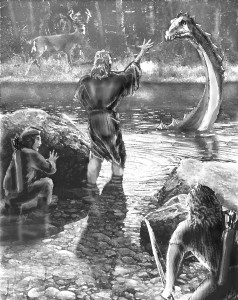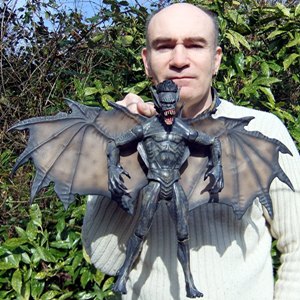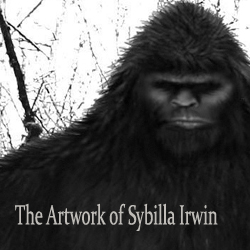The ‘Other’ Encounter Between a British Saint and a Lake Monster
Posted by: Karl Shuker on July 19th, 2014
Every self-respecting cryptozoologist knows – or should know – about the famous encounter claimed for St Columba and the Loch Ness monster during the 6th Century AD (its specific date varies from one authority to another). Having said that, in reality the encounter apparently took place not in the loch itself but in the River Ness – so the creature in question may not have had any bearing upon the cryptids allegedly frequenting the loch, but may simply have been a vagrant sea creature of known form, such as a bearded seal or possibly even a walrus. Anyway, regardless of its specifics, this encounter is, as I say, a very famous one in the annals of cryptozoology. Far less famous, however, yet no less interesting, is the ‘other’ encounter between a British saint and a lake monster.
(c) William Rebsamen
Born Crónán mac Bécáin sometime during the late 6th Century or early 7th Century AD (his age upon death is unrecorded but he is known to have died on 30 March 637 AD), St Mochua as he became was a notable early Irish saint. After completing his education at Bangor, he was reputedly led through many regions of Ireland by a miraculous fountain that could move of its own accord, and during that time he performed a considerable number of miracles himself. One of these involved a lake monster…
Further details can be found here on my ShukerNature blog.
About Karl Shuker
My name is Dr Karl P.N. Shuker. I am a zoologist (BSc & PhD), media consultant, and the author of 25 books and hundreds of articles, specialising in cryptozoology and animal mythology. I have a BSc (Honours) degree in pure zoology from the University of Leeds (U.K.), and a PhD in zoology and comparative physiology from the University of Birmingham (U.K.).
I have acted jointly as consultant and major contributor to three multi-author volumes on cryptozoology and other mysterious phenomena.
I am the Life Sciences Consultant to The Guinness Book of Records/Guinness World Records (Guinness: London, 1997-present day), and was consultant to Monsters (Lorenz Books: London, 2001), as well as a contributor to Mysteries of the Deep (Llewellyn: St Paul, 1998), Guinness Amazing Future (Guinness: London, 1999), The Earth (Channel 4 Books: London, 2000), and Chambers Dictionary of the Unexplained (Chambers: London, 2007).
I appear regularly on television & radio, was a consultant for the Discovery TV series Into the Unknown, and a question setter for the BBC's quiz show Mastermind.
I am a Scientific Fellow of the Zoological Society of London, a Fellow of the Royal Entomological Society, a Member of the Society of Authors, and the Cryptozoology Consultant for the Centre for Fortean Zoology (CFZ).
I have written articles for numerous publications, including Fortean Times, The X Factor, Paranormal Magazine, FATE, Strange Magazine, Prediction, Beyond, Uri Geller's Encounters, Phenomena, Alien Encounters, Wild About Animals, All About Cats, All About Dogs, Cat World, etc.
In 2005, I was honoured by the naming of a new species of loriciferan invertebrate after me - Pliciloricus shukeri.











Both saints are not “British”, they’re Irish which is quite another thing!
Encounter between an “IRISH” Saint not British tut tut. There are more, there is also St Kevin who banished a creature from a lake in Glendalough.
There is also the Killarney lake monster which is still being spotted to this day. Lots of storys about Horse Eels. I have been to all these places and have not seen a thing 🙁
I am using the term ‘British’ here in the geographical sense, i.e. appertaining to the British Isles, and Ireland is indeed one of the islands of the British Isles, second only in size to the island of Great Britain (in the article’s text I do specify that he was Irish by nationality). Yes, I know of the Irish horse-eels – I devoted a section to them in my book In Search of Prehistoric Survivors; it was only the encounter by St Mochua that I was concerned about in this particular article.
No, no, an Irish person is not “British”; a person from Ireland is Irish. Just letting you know … 🙂
Telling an Irish man that Ireland is a part of the British Isles is like telling a British man that Britain is in the French Isles 🙂
Not taking anything away from your work i do enjoy what you write. I will be doing some horse eel investigations myself later this year. I will be also following up on actual attacks in a man made lake called Blessington lakes. I have a couple of story’s about swimmers loosing toes and dogs loosing legs. But i only got them through word of mouth. I cannot find anything else reporting it.
A few weeks ago, I posted a very obscure account of a monster that was believed to exist in Capall Lake – an IRISH lake in the South of Ireland. I wonder if there is any connection between the name of the lake (capall means “horse” in Irish Gaelic) and the monster (water horse?) that once lived there.
I never heard of that lake, but I have only been to that area once. There could be something to it alright. I can’t even find that lake on a map. Here is the thing. The sightings are few and far between, alot of people would say folklore. But the descriptions do resemble the Cadborosaurus.
I hope it’s okay to post this again – I don’t know if you’ve got the Gaelic, Murmillo, so instead of giving the original, I’m posting the English version:
The Capall Lake was also known as Loch Eisc na gCaithne. The old people believed that there was a piast or monster in it.
The year 1883 was a year of hard frost and the Capall Lake was completely frozen over. It was Small Christmas Fair (Nollag na mBan) in Cahersiveen and when the Toreens people were coming home, with their horses and laden carts, past Clab Adhairce on the lake-shore, they heard the monster howling and bellowing in the lake. That was the last time he was heard and people think that he must have died that year.
– Pats Geoffrey of Tooreens
There ya go. 🙂
Not wishing to make an issue out of this, but: Defining what constitutes the British Isles: http://en.wikipedia.org/wiki/British_Isles_(terminology)
Geographically, the island of Ireland is part of the British Isles; consequently, from a purely geographical standpoint (although not from either a nationality standpoint or a political standpoint, which are entirely different matters), which is all that I was concerned with in my account, a person living in the British Isles is British.
*sigh* A person from Ireland is Irish, not only from the standpoint of nationality or political boundaries, but from a geographic standpoint, as well. Throughout the whole of history, Ireland has been considered to be a single geographic unit, not part of Britain or anywhere else.
In fact, I couldn’t even find any place in the Wikipedia link that you posted, where it says that a person from Ireland is considered “British”. Maybe I missed it – Did you see that somewhere in the article?
from the link you posted
The dictionary definition of British Isles is that it is a geographical term that refers to the whole of Ireland and Great Britain as well as the surrounding islands. It is sometimes incorrectly used as if identical to the UK or to refer to Great Britain and the surrounding islands, excluding the island of Ireland entirely. The BBC and The Times have style guides that mandate the dictionary definition but occasional misuse can be found on their web sites.
The term British Isles can also be considered irritating or offensive by some on the grounds that the modern association of the term British with the United Kingdom makes its application to Ireland inappropriate.
Thank you Murmillo for posting that excerpt from the link I gave earlier. I hope that this now makes the geographical definition of the British Isles perfectly clear; I don’t understand at all why Wee Falorie Man persists in trying to claim that the island of Ireland is not and never has been geographically part of the British Isles. It is and always has been, as the above excerpt makes clear, so I have no plans to discuss the matter further.
Actually, I said that “Ireland is not part of Britain or anywhere else”.
More importantly, I said that a person from Ireland is not considered British. Surely you must have noticed that nowhere in the wikipedia entry does it state that an Irish person is “British”.
I never said that it did. And no, a person from Ireland is not considered British in terms of nationality or political status (again, I never said that they were), but definitely so in terms of geography; when British is used as a geographical term it is an adjective relating to anything originating from the British Isles, so a person originating from anywhere in the British Isles can be correctly described as British, just as a person originating from anywhere in South America can be correctly described as South American, or from anywhere in Africa as African, etc. Which country within that group of islands or continent they come from is a subdivision of that adjective, so a person living in Brazil is both South American and Brazilian. And therefore, like it or not, in geographical terms (which is all I’m interested in here), someone living in Ireland is both British (as someone living in the British Isles) and Irish (as someone living in the island of Ireland within the British Isles). If you wish you argue the point further, may I suggest you do so with a geographer, who will no doubt be happy to provide you with ample supplementary information.
Silly me, where did I get the notion that Irish saints are, in fact, Irish rather than “British”?!
But seriously, I have never heard of Irish saints referred to as “British” by anyone ever – except you. Hmm … I wonder if there is any other person in the world who refers to Irish saints as “British” saints – I’ve never seen it.